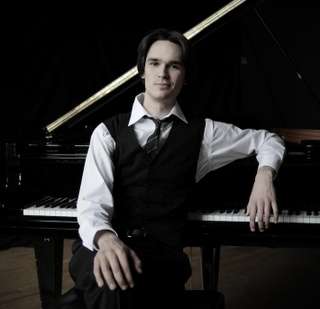|
Back
Storms and Poems New York
Estonian House Concert Hall
05/07/2010 -
Edvard Tubin: Ballade on a Theme by Mart Saar
Arvo Pärt: Variations for the Healing of Arinushka
Franz Liszt: Transcendental Etude No. 12 (“Blizzard”)
Maurice Ravel: Ondine from Gaspard de la Nuit
Franz Schubert/Franz Liszt: The Elf King
Robert Schumann: Fantasy in C Major, Opus 17
Mihkel Poll (Pianist)

M. Poll (© Kaupo Kikkas)
For music critics, these nights are rather Estonia-shing. On Wednesday, the Church of Ignatius Loyola performed Arvo Pärt’s Miserere and Beatitudes in the charming Jesuit church. Last night, in the equally charming, virginal white concert hall of Estonian House, on East 34th Street, the stunning 23-year-old Estonian pianist Mihkel Poll performed, amongst other works, two works by three Estonian composers. (Explanation later.)
And obviously, as conductor Neeme Järvi once assured me in an interview, “The wealth of music from my country is greater than anyone knows.” That may well be true.
This was Mr. Poll’s debut concert in America (with his second in Washington on Monday), but he is well-known in his native Tallinn. Not only has he won every piano prize in the country, but he has performed extensively, given concerts in Spain, Belgium, Russia and France, and performed that excruciatingly difficult work, Ligeti’s Piano Concerto. Thus, this first concert was highly anticipated.
Dressed in fearsome black, like an 18th Century Calvinist minister, Mr. Poll gave no hellfire sermons, but did produce keyboard fire from his instrument. He is certainly a deft technician and easily essayed two of Liszt’s Transcendental Etudes (one an encore), whipping through them with seeming ease.
While equally brilliant in the climax of Gaspard de la Nuit, where “Ondine” attempts to seduce a mortal to her powers, one doubts that mere brilliance would do the trick. Ravel was painting sprays, drops of water glinting in the sunlight, waters soaring, falling, evaporating. Mr. Poll began with a suspenseful pianissimo, but his sensitive start soon turned into, if not a tsunami, then a fearful storm. The work must be, above all (and no pun intended), as fluid as the waters. This was a rigid respectable performance.
Mr. Poll knows how to retain a mood, but not always to his advantage. The Liszt transcription of Schubert’s The Elf King started with a presto of agitated violence and continued throughout. While the triplet motif was blurred at times, one could blame that more on the acoustics of the room than Mr. Poll himself. (He is a conservative pedaler). But once again, this transcribed song is a picture: a conversation which is agitated, scary, even frightening. Mr. Poll’s was a storm of notes.
For the final work, Schumann’s C Major Fantasy, we saw a pianist who no longer tried to be impressive. Even with the questionable room acoustics, he could play that passionate left-hand figure and continue without swamping the melody with sounds. The march was more rigid than exhilarating, But oh, how Mr. Poll played the finale, producing poetry which had heretofore been lacking.
Most interesting were the two Estonian works which started the program. I thought it would be the first time hearing Arvo Pärt’s Variations for the Healing of Arinushka, but with the first simple notes, I realized that Ken Burns–who is always original in his choice of music–had used this piece in his documentary about war. There it was played to evoke utter sadness. Here it was played with the calm, the meditation and a deceiving simplicity. The bell sounds were softly clanged rather than softly gonged, but that was the environment, not Mr. Poll’s lovely playing.
Mart Saar is not known here, but he is third only to Pärt and Edvard Tubin in his native Estonia. So Tubin used one of Saar’s songs, the words describing seven tombs for seven periods of serfdom The chaconne, starting with a few bass notes, was transformed to a variety of moods, from sacrosanct to vehement and back again. Mr. Poll played it with all the stops out, for a very impressive start.
With a concluding encore of the Rachmaninoff G Major Prelude, he ended not with a bang, but the gentlest whisper of vernal poetry.
Mikhel Poll’s Website
Harry Rolnick
|